Equity, Diversity and Inclusion (EDI)
Standing Together
Students and staff at the University of Leicester are Standing Together to create an inclusive and respectful campus for working, learning and studying.
Standing Together is a University-wide programme improving wellbeing through tackling unacceptable behaviours and supporting students, and the wider University community, who are directly and indirectly affected. Standing Together engages all areas of the University including academics, the Accommodation Team, the Students’ Union, the Security Team, the Sports Team and, importantly, students.
The narrative thus far has been about standing together against unacceptable behaviours. The ultimate aim has to be moving towards standing together for something more positive.
The four areas of work under Standing Together are:
Awareness and engagement
Engaging with thousands of staff and students has enabled improved knowledge of unacceptable behaviours, supported increased reporting, and facilitated the use of Standing Together as a linchpin to building a safer and more inclusive campus.
Some examples of the awareness and engagement activities we’ve conducted over the past few years are listed below. We have:
- Given white ribbon pins to 2,000 staff and students for international days of action to tackle violence against women and girls
- Received ~500 signed anti-bullying pledges
- Developed the ‘Be the Influence’ campaign with Sports and mandated a ‘Wellbeing Officer’ in all 49 Team Leicester clubs and teams to foster acceptable behaviours and support all students involved
- Engaged with over 300 staff and students with ‘Caravan Theatre’, across 3 separate events/occasions
- Co-designed and created animations with students detailing acceptable bystander behaviours. This is now a key part of how we communicate our University ethos, e.g. used within teaching and welcome activities for students and staff. Other institutions have also requested use of these animations.
- Exhibited across 6 sites at the University to tackle myths and misconceptions about sexual violence – this work is ongoing and we are developing more to follow up on the initial exhibition.
1:1 student support
The main development to improve support for students under our case management commitments is the development of our own online reporting system.
The system is designed to allow for students to start their disclosure process their way. Students can disclose an incident on the system anonymously or by leaving contact information, and find out about additional support information through our support pages. Students can then receive end-to-end support depending on how they wish to progress with their holistic support and reporting options.
This development directly resulted from Standing Together and student requests for better reporting and more awareness of unacceptable behaviours.
For more support and reporting options please see our report and support webpages.
Disclosure and support process for cases of sexual misconduct
The following process will take place where students have provided consent and contact details.
Step 1: Disclosure

- Students can disclose sexual misconduct, harassment or violence to the University through report and support
- The University may receive information from the police and other external agencies.
Step 2: Assessment

- After a disclosure has been made, we contact the disclosing student within two working days to arrange a one-to-one supportive conversation.
- We talk to the disclosing student to gather information and discuss the disclosure.
- We undertake a needs assessment with the disclosing student to determine
support options, including referrals to internal and external support agencies, such as:
- External
- Specialist support (i.e. sexual assault referral centre)
- Counselling services
- Health services
- Internal
- Counselling services
- Welfare advisers
- Residential support services
- Academic support
- External
- We discuss options for reporting the disclosure to the police or to the University as a disciplinary matter.
- If the student reports as a University disciplinary matter, the disciplinary process begins.
Step 3: Continuous support
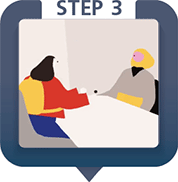
- We continue to support the disclosing student, re-evaluating requirements until the student’s needs are met.
Training
Working closely with the Standing Together team, the Centre for Hate Studies have developed a suite of free training modules on various aspects of Hate Crime. These can be accessed by anyone through registering for an account on their website.
Standing Together are also developing other training modules including:
- Standing together for community – information and guidance to help encourage being an active bystander
- Sexual violence myths and misconceptions – leading on from our recent ‘Let’s Talk about Sexual Violence’ exhibition
- Having sensitive conversations – information around receiving disclosures of mental health and other incidents
- Standing Together awareness – general information about Standing Together and our activities
For more information about training, or to book in a session, please email Liz Jennings at emj9@le.ac.uk.
Policy development
On 1 August 2019, we launched the University-wide dignity and respect at Leicester policy – the first policy at the University to cover the whole University community (including staff, students and visitors) and outline our University ethos and expectations around behaviour. This policy has been written in collaboration with Leicester Students’ Union, HR, Staff Health and Wellbeing, Student Support Services and the Trade Unions.
For more information about our dignity and respect at Leicester policy, please email dignityandrespect@le.ac.uk.
We are also currently re-working our student regulations. Please contact the Quality Office for more information (qualoffice@le.ac.uk).
Disciplinary process for cases of sexual misconduct
 Step 1: Report
Step 1: Report
- Report of sexual misconduct received by the University.
 Step 2: Assess
Step 2: Assess
- We assess the complaint, considering risks to wellbeing and safety of individuals involved and how risks need to be managed.
- If the wellbeing and safety of
individuals is at risk, we will refer
the complaint to the Cause for
Concern Group, who may take the
following actions:
- Contact the police.
- Implement precautionary measures, including no-contact orders.
- We determine whether the complaint should proceed to a formal investigation or seek an alternative resolution.
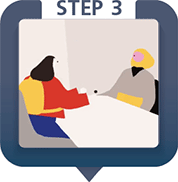 Step 3: Formal investigation
Step 3: Formal investigation
- We meet with the reported student and inform them of allegations and process.
- An Authorised Officer, usually a member of staff from the Student Conduct Group, will be appointed to oversee the investigation of the complaint.
- The Authorised Officer or appointed representative undertakes interviews with parties involved, gathers information and produces a full written report of findings and recommendations.
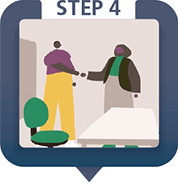 Step 4: Determine outcome
Step 4: Determine outcome
- The Authorised Officer will
determine the outcome of the
formal investigation:
- Disciplinary action, or
- Referral to a Student Discipline Panel hearing to resolve complex cases, or
- No further action.
- Disciplinary action might include a reprimand or temporary exclusion.
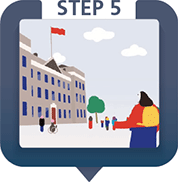 Step 5: Student Discipline Panel
Step 5: Student Discipline Panel
- The Student Discipline Panel will consider the case and provide the student with an opportunity to respond.
- The Panel will then determine
the outcome, either:
- No further action, or
- Penalties as appropriate, up to and including expulsion from the University.
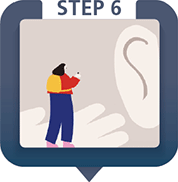 Step 6: Appeals
Step 6: Appeals
- Usually the student will be entitled to appeal the disciplinary outcome.
- A member of the Student
Conduct Group will review the
submission and determine the
next steps:
- Decision remains, or
- Action to revise the penalty, or
- A full appeal hearing.
This process is intended as an overview. However, some steps may vary according to individual cases.
Get in touch
- For a full list of support services, please visit the student support webpages
- If you need more information about Standing Together, please contact standingtogether@le.ac.uk.
Background
Standing Together began as a collaboration between the University, Students’ Union and students in 2015. It was developed, drawing on Office for Students funding, in 2017 in order to tackle the international issue of sexual harassment and sexual violence on University campuses.
As work has continued, Standing Together has expanded to take on other unacceptable behaviours and issues such as bullying and hate, as well as bringing together different teams from across the institution to now encompass a whole-University approach to preventing unacceptable behaviours. Standing Together aims to help us bring all of these elements under one banner, drawing upon a wealth of support and research expertise from academic teams.
In Standing Together against these behaviours, we are making a clear statement that students and staff are united in creating a campus culture of equality, diversity and inclusion.
Most importantly, all the work under Standing Together helps to highlight the support options available to those who have been affected.
For more information about how to get help, please visit the Student Support webpages.